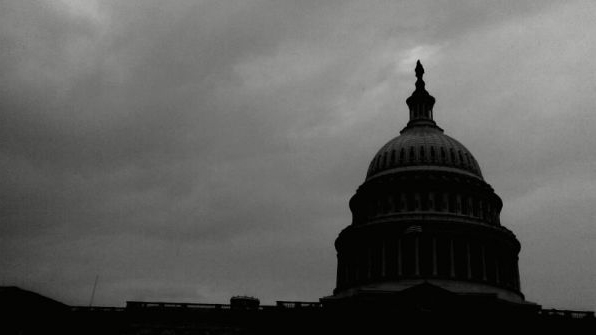This post was first published at Consortium News.

The Capitol building with storm clouds behind it. (brownpau/Flickr CC 2.0)
In a previous piece, I described how the Republican Party and its ideological allies in the fundamentalist churches have confected a comprehensive media-entertainment complex to attract low-information Americans and turn them into partisans.
It would be comforting to believe that somewhere in the commanding heights of our permanent government, there are important players who are serious grownups who know what they are doing. That, at least, is the impression they seek to convey with their sober demeanors, credentials from think tanks or prestigious universities, and the measured, almost soporific testimony they deliver to congressional committees.
Think of Robert Gates, Ashton Carter, Timothy Geithner or Eric Holder. On the surface, they seem the very antithesis of the tea party fanatic, gibbering about ISIS training camps in America. The preferred pose of these establishment personages is that of the politically neutral technocrat offering well-considered advice based on their profound expertise.
That pose is nonsense. They are deeply dyed in the hue of the official ideology of the governing class, an ideology that is neither specifically Democrat nor Republican. Domestically, whatever they might privately believe about essentially diversionary social issues (“rube bait”) like abortion or gay marriage, they almost invariably believe in the “Washington Consensus”: financialization, outsourcing, privatization, deregulation and the commodification of labor.
Internationally, they espouse Twenty-first Century American Exceptionalism: the right and duty of the United States to meddle in every region of the world, coercive diplomacy, boots on the ground, and the right to ignore painfully-won international norms of civilized behavior. To paraphrase what Sir John Harrington said over 400 years ago about treason, now that the ideology of the Deep State has prospered, none dare call it ideology.
Let us consider some of the tenets of their faith:
- Almost a decade and a half later, it is now permissible to suggest that the invasion of Iraq was less than well considered. But to actually hold the authors of the invasion politically accountable is taboo and to suggest criminal culpability is to get oneself ejected from the salons of the Consensus.
- There is ample evidence of conscious criminal malfeasance, including selling investment instruments deliberately designed to fail, in the financial saturnalia leading, in 2008, to the greatest global economic collapse in 80 years. But our highest law enforcement official said maybe we shouldn’t prosecute the high-level instigators. Why? Just because.
- ISIS is seen in Washington as a grave terrorist threat with the potential to knock over the unpopular and unstable regimes of the Middle East (i.e., our client states) like bowling pins. Yet the Washington Consensus sees as the key to defeating ISIS the undermining of the regime of Bashar al-Assad, ISIS’s principal military enemy. If a US general in 1942 declared the only way to defeat the Wehrmacht would be for us to fight Nazi Germany and the USSR simultaneously, he would have been committed to a lunatic asylum.
- Could widening income inequality just possibly have something to do with corporations and the rich inducing their bought-and-paid-for politicians to rewrite the tax code, trade laws, labor protections and pension rules – in other words, rigging the system? Oh, no, it was all inevitable, say the “sensible centrists”; that’s just the way the world works. So maybe if the little people just got off their duffs, loaded up on student debt, and got educated, they’d be ready for the brave new world of the Washington Consensus.
- American International Group executives whose malfeasance or incompetence led to the company being bailed out (and nationalized in all but the name) by the American taxpayer are entitled to keep their stratospheric salaries and bonuses because of a holy principle called “sanctity of contract.” Do autoworkers, or pensioners of the City of Detroit, get to keep their previously agreed-to compensation? No, because that’s how a globalized economic system works.
These examples reveal a display of infantile logic or pernicious mendacity every bit as flagrant as Ben Carson’s mumblings or Donald Trump’s berserker rants. Yet, rather than selling snake-oil miracle health cures, as Carson and Mike Huckabee have done, the people who inflict this nonsense on us typically wind up teaching at the Kennedy School of Government, or serving as the president of a university or as a board member of a Fortune 500 company.
The principal enforcer of those taboos is the prestige media. Their main method is to define “objectivity” to mean “a refusal to judge.” But when the truth is accessible and corroberable, it would be silly to stage a debate in which proponents of a spherical earth and champions of a flat earth receive equal time, with the debate’s moderator expressing doubt as to the verdict until one side or the other triumphs with clever rhetoric. Yet that is the prestige press’ default position.
It is occasionally refreshing when outlandish characters like Trump refuse to play by the rules. For 14 years, whether and to what extent George W. Bush’s potential nonfeasance (or actual negligence) facilitated the Sept. 11, 2001 terrorist attacks, has generally been an off-limits subject for the mainstream media.
Only when Trump broached the subject was the press free to jump on it. And the interviewer, Bloomberg’s Stephanie Ruhle, immediately interrupted Trump by blurting out, “Hold on, you can’t blame George Bush for that!” One wonders whether she was doubtful of the truth of his statement or worried about the potential blowback against her career.
As Josh Marshall, editor of Talking Points Memo, pointed out, the American media naively (or timidly) treated House Republicans’ interminable hearings on the assault on the US consulate in Benghazi, Libya, as if it were a serious and judicious attempt to determine the facts in the case. It was only when Rep. Kevin McCarthy (R-CA), the House majority leader, committed a Freudian slip by saying that the hearings were designed to derail Hillary Clinton’s presidential campaign, that the press was “allowed” to judge the intent of the House Republicans’ investigation.
And sure enough the media have responded, with even Newsweek, normally a purveyor of conventional wisdom, publishing a sharp critique of the kangaroo-court aspect of the investigation. That said, one tack the media will not take on Benghazi is to look at the bigger picture: that the intervention in Libya was a massive, bipartisan failure of the Washington Consensus, with the Obama administration executing it and the House and Senate Republican leadership egging it on.
Normally free from criticism, much less accountability, the careerists of Washington enjoy a lucrative racket. Take General Keith Alexander, the former director of the National Security Agency. On his watch the most massive leak of government secrets in history occurred, and several members of Congress also claimed he misled them about the scope and legality of his agency’s collection of Americans’ private information.
Yet he managed to parlay those failures into a big payday. In 2014, Alexander set himself up as the head of a consulting boutique called IronNet Cybersecurity. His principal client is one of Wall Street’s largest lobbying groups, the Securities Industry and Financial Markets Association (SIFMA), from which he receives $600,000 per month.
The money is often beyond the dreams of avarice, but that is not the only factor in play. All the big players have been sheep-dipped in a world view that becomes a reflex.
The twin seductions of money and Washington “group think” have led our Wise Men into one disaster after another in both domestic and foreign policy. In view of their lamentable record over the last decade and a half, their advice and counsel is probably no better than that of a snake-handling shaman in the remotest hollow of West Virginia, and certainly a good deal more expensive.


